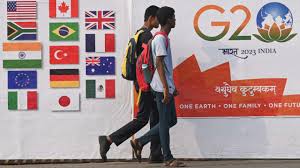In a country where millions suffer poverty and deprivation, the ideas India espouses globally must see light of the day within the country

It is just over four months since the rotation of the G20 presidency from Indonesia to India. Goa came face-to-face with G20 in April when the 2nd Health Working Group meeting under India's G20 Presidency was held. More than 180 delegates from nineteen G20 member countries, 10 invited states and 22 international organizations participated. At the level of government, it was deemed as a key achievement. For the common folk, it was added nuisance value. Goa got the lower rungs of politicos while other States will get to host events of greater significance.
Goans roads were spruced up to give the impression that Goa was a modern state with impressive infrastructure and conference conveniences. Impressive banners camouflaged spaces where the poor and underprivileged live in sub-human conditions much like the Wall hastily built ahead of Trump’s 2020 visit to Gujarat censured as 'hiding poor people'. Political lethargy, and delayed preparations left citizens bearing the brunt of government sluggishness.
Thanks to the Centre, the Sate government will invest a whopping Rs 300 crore for the eight G20 meetings slated to be held in Goa over the next five months. The electricity department alone has reportedly spent Rs 45 crore to overhaul power infrastructure. The budget does not expose spending in other divisions of government: PWD, Waste Management, remnants of the unfinished Smart City projects. Jobs for the unemployed must wait.
Sanjit Rodriguez, Chief Nodal Officer, rather casually and audaciously stated that the inconvenience must be accepted as a reward for a better city. He made oblique comparisons of ongoing works to when Goa first hosted the IFFI. The high and mighty do not live through the hassles of the average citizen and the poor. Event-oriented developments are essentially show pieces for which this government is becoming notorious. In any case, why were these plans not in place well ahead for rightful use by the citizens, rather than a two-day show for foreigners?
The government even announced the launch of heritage walks for G20 visitors to glass-case the city’s cultural locations. Is the government even remotely aware of multiple citizen-led heritage tours happening around Goa? Rather than highlight these well-researched/innovative initiatives and piggy-back on them, government chose to highlight the city’s infrastructure facilities in a tearing unplanned hurry sans capacity for the same. Tour guides trained by the government tend to carry out pseudo-shows in tourist places. If only, one takes a government-licensed tour and people-initiated tour (PIT), the difference is mammoth. PIT has quality and substance plus a human touch. Bureaucrats and the executive should leave matters of finesse and culture to the people and private sector. They must be ‘hands-off’ on this because heritage and culture belong in the realm of citizens, and is not for government to appropriate.
The BJP wants political capital out of a routine global political transition. In the rest of the world, India as chair of G20 will go unnoticed. India has chosen to spend millions on billboards and front-page advertisements in newspapers when the rotation of the G20 presidency from Indonesia to India is a non-event in much of the world. India is one of the poorest countries in the grouping. The world knows that India has a dismal record of deadly human rights violations, minority oppression, deepening instability of democratic traditions, and fear of dissent. Many political dissenters languish in jail without trial for long years and with no recourse to justice. Their only fault (if that is one) is that they spoke out for justice in favour of minorities, dalits, tribals, farmers, workers, and for causes that left the weaker sections disempowered and marginalised. Further, India’s role will conclude on November 30, 2023. This one-year stint will not give weight to an Olympic bid in 2035 as a Central Minister ludicrously asserted.
G20 summits focus not only on macro economy and trade; but also on a wide range of global issues which impact the global economy since globalization started progressing and various issues became more intricately intertwined. Those issues included overall development, climate change and energy, health, counter-terrorism, as well as migration and refugees.
Almost immediately after India took its place as Chair of G20, the PM declared that this was India’s ‘Vishwaguru’ moment’. Boastfully, India declared that “the world is looking to India for solutions to ‘brick-and-mortar’ problems but also to bridge the schisms in our minds and hearts”. (‘Vishwa Guru’ is a Sanskrit phrase and idea which translates to world and universe guru/teacher”). Many nations, who observe India’s conditions of poverty and injustice, will punctuate that claim with a question mark. India calls out: “Let us join together” to make this time as one of “healing, harmony, and hope”. PM Modi added as an ideal: “There is no doubt that growing polarization and clashes of ideologies can be overcome through the “lasting appeal of so many spiritual traditions that advocate the fundamental one-ness of us all.”
India's G20 presidency has pledged to advance the notion of “One Earth-One Family-One Future”. This vision is in sharp contrast to a fractured community where minority and caste-class persecution thrive. Many dread to speak their minds on politics fearing punitive action. PM Modi desires a vibrant pluralism world-wide. India contradicts itself with its hard-to-reconcile inherent divisions.
G20 has come for just a year and will pass hands to Brazil in 2024. The dreadful splurge of public money into what should ordinarily be a low-profile people’s development agenda is stinging our scanty resources. In a country where the teeming millions suffer poverty and deprivation, the ideas India espouses globally must see the light of the day within the country. Or else, G20 will end having merely drained our assets.